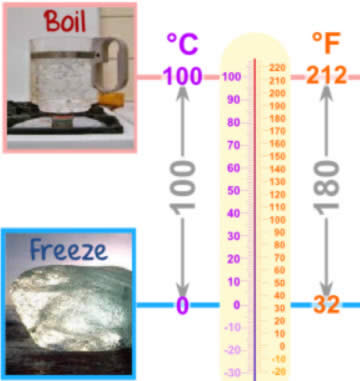Conversion of Temperature
Quick Celsius (°C) / Fahrenheit (°F) Conversion:
Just type a value in either box:
Or this method:
| °F to °C | Deduct 32, then multiply by 5, then divide by 9 |
| °C to °F | Multiply by 9, then divide by 5, then add 32 |
|  |
Typical Temperatures
| °C | °F | Description |
|---|
| 100 | 212 | Water boils |
| 40 | 104 | Hot Bath |
| 37 | 98.6 | Body temperature |
| 30 | 86 | Beach weather |
| 21 | 70 | Room temperature |
| 10 | 50 | Cool Day |
| 0 | 32 | Freezing point of water |
| -18 | 0 | Very Cold Day |
| -40 | -40 | Extremely Cold Day (and the same number!) |
| (bold are exact) |
Explanation
There are two main temperature scales:
- °F, the Fahrenheit Scale (used in the US), and
- °C, the Celsius Scale (part of the Metric System, used in most other countries)
They both measure the same thing (temperature!), but use different numbers:
- Boiling water (at normal pressure) measures 100° in Celsius, but 212° in Fahrenheit
- And as water freezes it measures 0° in Celsius, but 32° in Fahrenheit
Like this:
Looking at the diagram, notice:
- The scales start at a different number (0 vs 32), so we will need to add or subtract 32
- The scales rise at a different rate (100 vs 180), so we will also need to multiply
And this is how it works out:
| To convert from Celsius to Fahrenheit, first multiply by 180/100, then add 32 |
| To convert from Fahrenheit to Celsius, first subtract 32, then multiply by 100/180 |
Note: 180/100 can be simplified to 9/5, and likewise 100/180=5/9, so this is the easiest way:
| °C to °F | Multiply by 9, then divide by 5, then add 32 |
| °F to °C | Deduct 32, then multiply by 5, then divide by 9 |
We can write that as a formula like this:
Celsius to Fahrenheit
|
(°C × 9/5) + 32 = °F
|
Fahrenheit to Celsius
|
(°F - 32) x 5/9 = °C
|
Example: Convert 26° Celsius (a nice warm day) to Fahrenheit
First: 26° × 9/5 = 234/5 = 46.8
Then: 46.8 + 32 = 78.8° F
Example: Convert 98.6° Fahrenheit (normal body temperature) to Celsius
First: 98.6° - 32 = 66.6
Then: 66.6 × 5/9 = 333/9 = 37° C
Other Methods That Work
Use 1.8 instead of 9/5
9/5 is equal to 1.8, so you could also use this method:
Celsius to Fahrenheit:
|
°C × 1.8 + 32 = °F
|
Fahrenheit to Celsius:
|
(°F - 32) / 1.8 = °C
|
To make "×1.8" easier you can multiply by 2 and subtract 10%, but it only works for °C to °F:
Celsius to Fahrenheit:
|
(°C × 2) less 10% + 32 = °F
|
Example: Convert 20° Celsius (A nice day) to Fahrenheit
- 20x2 = 40
- less 10% is 40-4 = 36
- 36+32 = 68° F
Add 40, Multiply, Subtract 40
Since both scales cross at -40° (-40° C equals -40° F) you can:
- add 40,
- multiply by 5/9 (for °F to °C), or 9/5 (for °C to °F)
- subtract 40
Example: Convert 10° Celsius (A cool day) to Fahrenheit
- 10+40 = 50
- 50×9/5 = 90
- 90-40 = 50° F
To remember 9/5 for °C to °F think "F is greater than C, so there are more °F than °C"
Quick, but Not Accurate
Celsius to Fahrenheit:
|
Double, then add 30
|
Fahrenheit to Celsius:
|
Subtract 30, then halve
|
Examples °C → °F:
- 0° C → 0+30 → 30° F (low by 2°)
- 10° C → 20+30 → 50° F (exact!)
- 30° C → 60+30 → 90° F (high by 4°)
- 180° C → 360+30 → 390° F (high by 34°, not good)
Examples °F → °C:
- 40° F → 10/2 → 5° C (almost right)
- 80° F → 50/2 → 25° C (low by about 2°)
- 120° F → 90/2 → 45° C (low by about 4°)
- 450° F → 420/2 → 210° C (low by about 22°, not good)

